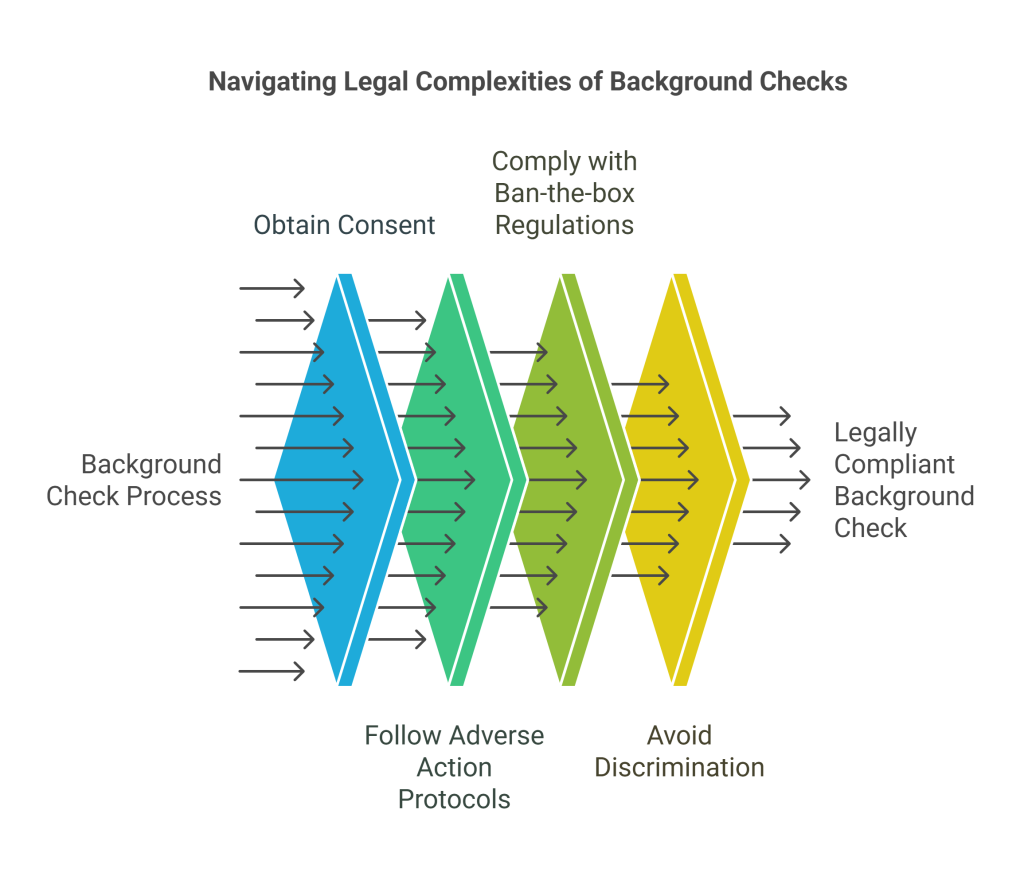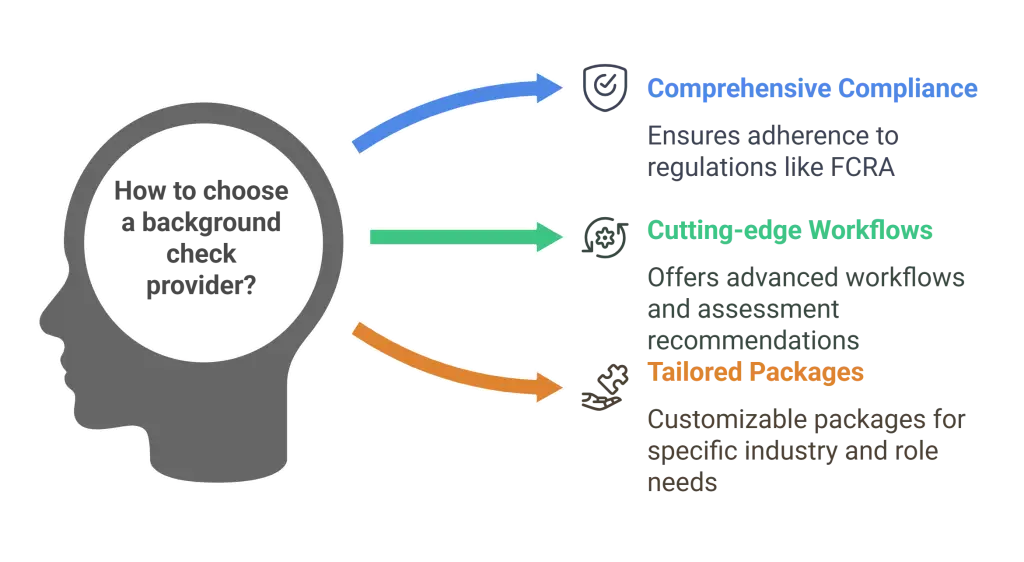Employment background checks are crucial in today's corporate world. GCheck conducts expert checks to ensure organizations hire trustworthy candidates with genuine qualifications. Understanding the nuances of background checks is essential for any organization aiming for excellence.
Key Takeaways
- Establish a Comprehensive Background Check Policy: Develop a clear policy outlining the types of checks to be conducted, decision-making criteria based on results, and the appropriate timing within the hiring process. This ensures consistency and legal compliance.
- Understand Legal Obligations: Familiarize yourself with laws such as the Fair Credit Reporting Act (FCRA) and "Ban-the-Box" regulations to ensure candidate rights are protected and to avoid legal repercussions.
- Select a Reputable Background Check Provider: Choose a provider that offers comprehensive services, adheres to legal standards, and can tailor their offerings to your organization's specific needs.
- Utilize Various Types of Background Checks: Incorporate multiple checks, including criminal records, civil court cases, credit history, driving records, drug screenings, and verification of employment and education, to gain a holistic view of a candidate's background.
- Maintain Transparent Communication with Candidates: Inform candidates about the background check process, obtain their consent, and provide them access to results, ensuring a fair and transparent hiring experience.
Every organization, regardless of its size or industry, should have a well-defined employment background check policy. This policy acts as a blueprint, guiding HR professionals through the intricate maze of candidate screening.
- Types of Checks to Conduct: Different roles require different kinds of checks. For example, credit checks are essential for finance roles, while driving record checks are more relevant for transportation roles.
- Decision-making Based on Check Results: The policy should state check criteria, including offense severity, relevance to job, and time elapsed.
- Timing of the Checks: According to federal and local regulations, background checks must be conducted at a specific point during the hiring process.
A written policy not only ensures a consistent approach but also protects against potential legal pitfalls and accusations of discrimination. Companies such as GCheck offer guidance on creating comprehensive and compliant policies.
EXPERT INSIGHT: As the safe-keepers of the hiring process, we in the HR department are entrusted with the responsibility of finding the right people who not only fit technically but also align with our core values. A key step is administering bias-free employment background checks which are not just a legal requirement but a key step in ensuring we bring in qualified and trustworthy candidates. It is essential that we handle background checks with transparency -- respecting candidates' rights every step of the way. This commitment to fairness helps us build an ethical workforce and ensures we are making decisions that align with legal standards and our organizational values. - Charm Paz, CHRP
Navigating the Legal Labyrinth
Background checks, while invaluable, are fraught with legal complexities. Organizations must be acutely aware of these to avoid potential legal quagmires.

- Consent is Paramount: The Fair Credit Reporting Act (FCRA) mandates that candidates be informed about the impending background check in writing. This ensures transparency and protects candidates' rights.
- Adverse Action Protocols: As per the Fair Credit Reporting Act (FCRA), employers must adhere to a specific process when negative information is found during a background check that could potentially lead to an unfavorable hiring decision.
- Ban-the-box Regulations: Different regions have their own laws defining the specific circumstances under which background checks can be carried out. The primary aim is to prevent making premature judgments based on an individual's previous actions.
Title VII of the Civil Rights Act of 1964 prohibits discrimination based on race, color, religion, sex, or national origin. Screening policies must be crafted with this in mind to prevent inadvertent discrimination.
The Quest for the Perfect Background Check Provider
The choice of a background check provider can make or break the screening process. Organizations must choose a provider that aligns seamlessly with their unique needs. GCheck, for instance, offers a blend of cutting-edge technology and industry expertise, making it a preferred choice for many.

- Comprehensive Compliance Features: The provider must implement suitable features to ensure adherence to various regulations, including the FCRA.
- Cutting-edge Workflows: The provider should have state-of-the-art adverse action workflows and offer individualized assessment recommendations.
- Tailored Packages: The packages offered by the provider should be customizable according to the specific industry and role requirements.
Deciphering the Different Types of Employment Background Checks
Background checks are not monolithic. There are various types, each offering unique insights into a candidate's past.

- Criminal Record Checks: Criminal background checks can uncover a candidate's criminal record at different levels - national, state, federal, or county.
- Civil Court Checks: These checks provide insights into non-criminal lawsuits and claims involving the candidate.
- Credit Checks: provide a window into a candidate's financial past, revealing any credit irregularities.
- Driving Record Checks: These checks are indispensable for transportation roles, revealing driving-related violations.
- Drug Screening: In industries where safety is crucial, drug testing can detect recent drug use and ensure a safe work environment.
- Employment and Education Verification: These checks validate the authenticity of a candidate's claims regarding their work history and educational qualifications.
- Healthcare Sanctions Checks: For roles in the healthcare sector, these checks provide insights into a professional's medical background.
- International Background Checks: For candidates with international exposure, these checks can verify records from overseas.
The Art of Communication
Open, transparent communication with candidates about the background check process is not just a best practice; it's imperative.
- Setting Expectations: It is advisable to provide candidates with information regarding the purpose of the background check to prevent any unexpected outcomes.
- Access to Results: Candidates need access to their results and dispute options.
The FCRA has enshrined certain rights for candidates, and organizations must ensure adherence to these throughout the screening process.
Frequently Asked Questions
What factors influence background check cost?
Background check costs vary significantly depending on several factors. The type and depth of the check are primary drivers; a basic criminal record check will generally be less expensive than a comprehensive search including education verification, employment history, and credit reports. The scope of the search, such as the number of jurisdictions covered and the complexity of accessing records, also plays a role. Additionally, the vendor chosen for the background check impacts cost, with some providers offering bundled services or tiered pricing. Employers can manage these expenses by carefully defining their screening needs, focusing on checks relevant to the specific job role, and selecting reputable vendors that offer transparent pricing and efficient services.
To further control expenses, employers should prioritize checks based on risk assessment, streamlining the process for lower-risk positions. Leveraging technology for automated checks and integrating background screening with HR systems can also improve efficiency and reduce administrative costs. Ultimately, understanding the components of background check costs allows employers to make informed decisions, ensuring they conduct thorough screenings while staying within budget and maintaining compliance, as outlined in our comprehensive guide.
What is an employment background check?
An employment background check is a process employers use to verify the accuracy of a candidate's personal, professional, and educational details, and to uncover any potential red flags in their history.
What do employers typically look for in a background check?
Employers commonly verify employment history, education credentials, criminal records, credit history, driving records, and references to ensure the candidate is a good fit for the role.
How long does an employment background check take?
Most background checks are completed within 1–5 business days, but certain checks, like verifying international education or criminal records, may take longer.
Can an employer run a background check without my consent?
No, under the Fair Credit Reporting Act (FCRA), employers in the United States must obtain written consent from the candidate before conducting a background check.
What disqualifies a candidate in a background check?
Disqualifying factors may include discrepancies in employment or education history, criminal convictions relevant to the job, poor credit history for financial roles, or failed drug tests.
Do arrests show up on an employment background check?
Arrests may show up on a background check, but many states restrict the use of arrest records that did not lead to a conviction in hiring decisions.
How far back do employment background checks go?
Most checks go back 7–10 years for criminal and credit history. However, this depends on state laws and the nature of the job.
What is a pre-employment background check?
A pre-employment background check is conducted before a job offer is finalized to verify the candidate's qualifications and ensure compliance with legal and company standards.
Are credit checks part of employment background checks?
Yes, some employers include credit checks, especially for roles involving financial responsibilities. However, they must comply with state laws regulating this practice.
What states have "ban the box" laws?
States with "ban the box" laws include California, New York, Illinois, and many others, which restrict employers from asking about criminal history on initial job applications.
Can I run a background check on a potential employee myself?
Yes, but it's recommended to use a professional background check service to ensure compliance with FCRA and other federal and state regulations.
What are FCRA-compliant background checks?
FCRA-compliant checks adhere to the Fair Credit Reporting Act, ensuring that employers follow proper procedures for obtaining, using, and notifying candidates about background check results.
Do dismissed charges appear on background checks?
Dismissed charges may appear on some checks, but certain states prohibit using them in employment decisions.
What should I do if there’s an error in my background check?
If you find an error, contact the background check company and dispute the information under FCRA guidelines. They are required to investigate and correct any inaccuracies.
How much does an employment background check cost?
The cost ranges from $20 to $100+ per candidate, depending on the depth of the check and services included.
Are background checks required by law for all jobs?
No, but some industries, like healthcare, education, and finance, may require background checks by law to ensure safety and compliance.
What is the difference between a federal and state background check?
A federal background check reviews records from federal courts, while a state check reviews records from state and local jurisdictions.
Can an employee be fired for failing a background check?
Yes, but the employer must provide a copy of the report, explain the reason, and allow the employee to dispute the findings under the FCRA.
What is included in a criminal background check?
A criminal background check may include felony and misdemeanor convictions, pending cases, and, in some cases, arrest records.
Are social media checks part of employment background checks?
Some employers review public social media profiles to assess a candidate’s behavior and professionalism, but this must be done cautiously to avoid discrimination claims.
Conclusion
Employment background checks are crucial to maintaining workforce integrity. Companies can make informed decisions by following legal guidelines, selecting the right provider, and maintaining transparent communication with candidates. Thorough background checks can improve the quality of hires, leading to long-term success for the organization.
By integrating comprehensive background checks into our hiring process, we take a step towards attaining a safe and healthy work environment with respect at its core. It is not only safeguarding our workplace but also cultivating a culture of fairness and trust. When done correctly, these checks provide helpful insights that allow us to make confident decisions while minimizing risk and costly mistakes. As organizations, we must stay up-to-date with ever-changing regulations along with fast-phased technology.

GCheck Editorial Team
Meet the GCheck Editorial Team, your trusted source for insightful and up-to-date information in the world of employment background checks. Committed to delivering the latest trends, best practices, and industry insights, our team is dedicated to keeping you informed.
With a passion for ensuring accuracy, compliance, and efficiency in background screening, we are your go-to experts in the field. Stay tuned for our comprehensive articles, guides, and analysis, designed to empower businesses and individuals with the knowledge they need to make informed decisions.
At GCheck, we're here to guide you through the complexities of background checks, every step of the way.






